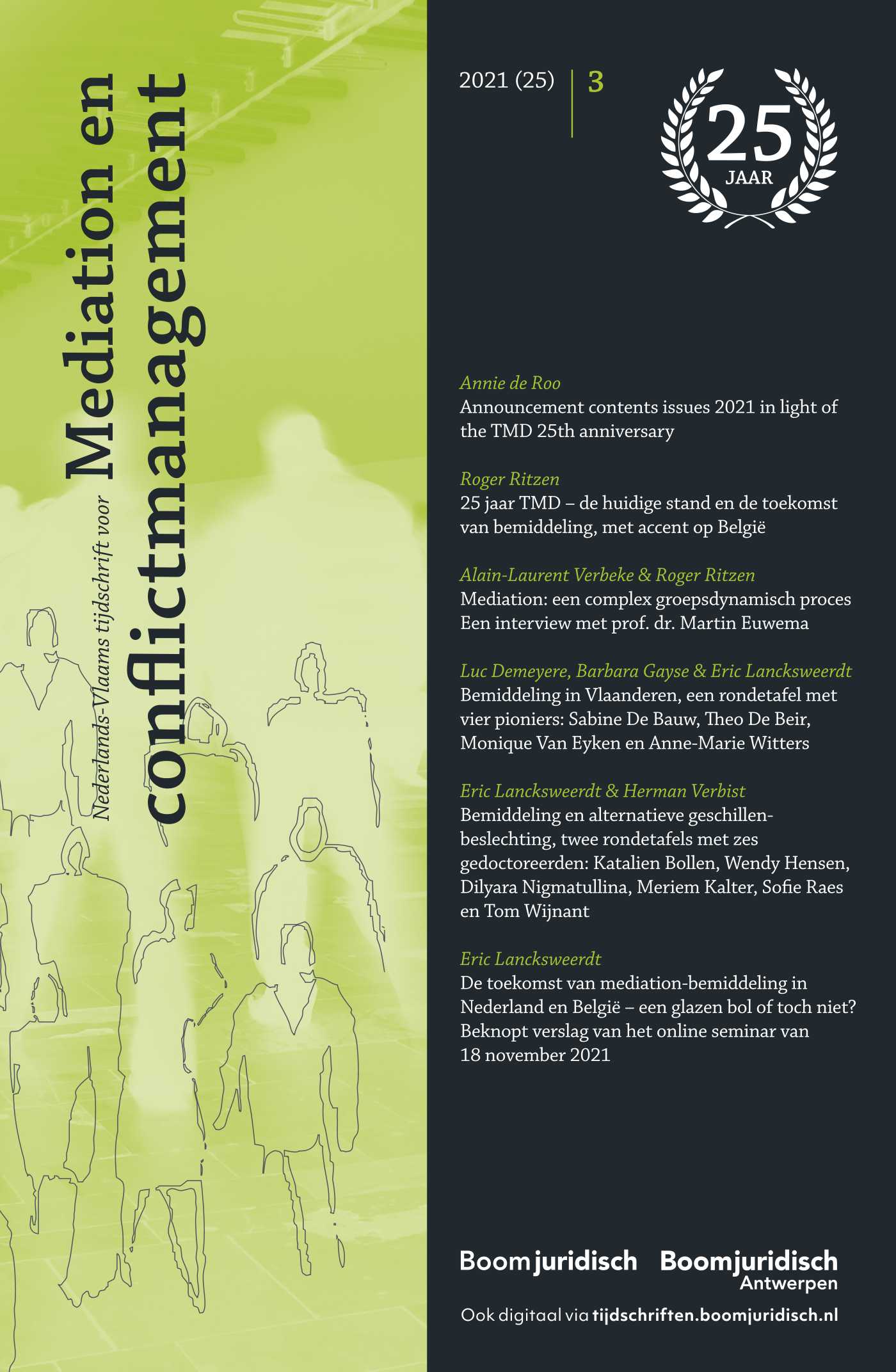|
An interview was held with Lex Penders, judge in the court of Utrecht. Subject of the interview was the role of the judge as regierechter (judge-conflictmanager) in the pilot project Customized Conflict Resolution. He talks about his experiences in the pilot and his ideas for future improvements in court hearings. |


Nederlands-Vlaams tijdschrift voor mediation en conflictmanagement
Meer op het gebied van Mediation en herstelrecht
Over dit tijdschriftMeld u zich hier aan voor de attendering op dit tijdschrift zodat u direct een mail ontvangt als er een nieuw digitaal nummer is verschenen en u de artikelen online kunt lezen.
| Redactioneel |
Maatwerk in conflictoplossing – mogelijkheden en beperkingen |
| Auteurs | Annie de Roo |
| Artikel |
Interview met Lex Penders, regierechter in Utrecht |
| Trefwoorden | interview, Pilot Customized Conflict Resolution, judge-conflictmanager |
| Auteurs | Brigitte Chin-A-Fat en Bart Prinsen |
| SamenvattingAuteursinformatie |
| Artikel |
De rechter als conflictmanager; een experiment uit de praktijk |
| Trefwoorden | conflictoplossing op maat, conflictdiagnose door de rechter, conflictdiagnose door de rechter, partijperspectief |
| Auteurs | Machteld de Hoon |
| SamenvattingAuteursinformatie |
|
Nowadays, court hearings play a central part in Dutch civil procedures. Until recently, little was known about how these hearings took place and how the parties involved experienced them. From the perspective of the parties involved, it is better if judges do not only resolve disputes legally, but also act as a conflictmanager. For this purpose, a method called ‘Conflictoplossing op maat’ (‘Customized conflict resolution’) was introduced by Machteld Pel (former director of The Netherlands court-connected mediation agency). In this paper I discuss the method as well as the results from an experiment in practice. In short, the results indicate that the method is, though not easy to implement, useful to improve the hearings of court procedures in disputes between civilians. |
| Artikel |
De Turnaround Kamer van de rechtbank?Naar een alternatief systeem voor reorganisatie en conflictoplossing bij dreigende insolventie |
| Trefwoorden | resolving financial distress, turnaround management, (court-annexed) bankruptcy mediation, insolvency |
| Auteurs | Jan Adriaanse |
| SamenvattingAuteursinformatie |
|
In this article it is argued that bankruptcy courts really can help in preventing distressed companies to become bankrupt. However, the use of judicial reorganization procedures (moratoria) should then be abolished. By nature judicial reorganization instruments invoke polarization of debtors and creditors in fact making the (financial) problems of distressed companies worse. A new system for reorganization and dispute settlement should be introduced, at least in the Netherlands, in which insolvency judges act as mediators in confidential negotiation sessions between companies and their creditors. These negotiations should take place at an early stage of the insolvency process, in to be established (neutral) ‘Turnaround Chambers’ of district courts, and should be accompanied by a holistic business turnaround process taking place at the company at stake. By introducing this alternative system the dramatic failure rate of current judicial reorganization procedures (between 73%-95% in the Netherlands) can and will be reduced dramatically. |
| Artikel |
Mediation, caucus en het strategisch evenwicht tussen partijen |
| Trefwoorden | mediation, caucus, strategic balance |
| Auteurs | M.A. Overman |
| SamenvattingAuteursinformatie |
|
The option of caucusing – i.e. one-on-one conversations between the mediator and one of the parties – is what makes mediation different from other types of conflict resolution. Both the view that all that is discussed in the caucus should remain confidential and the view that this should essentially be shared with the other party lead to suboptimal results. Economically inefficient outcomes caused by strategic actions by the parties can be avoided if the mediator communicates the information disclosed to him/her in the caucus to the other party in such a way (‘noisy translation’) that this other party cannot use this information to the disadvantage of the disclosing party. |
| Artikel |
Het Alassini arrest en verplichte bemiddeling |
| Trefwoorden | Universal Service Directive 2002/22/EU, mediation, conciliation, prejudicial question |
| Auteurs | Rob Jagtenberg |
| SamenvattingAuteursinformatie |
|
In the case of Rosalba Alassini v. Telecom Italia SpA the Court of Justice of the European Union has for the first time decided (18 March 2010) on the compatibility of a (Italian) statute mandatorily prescribing conciliation prior to application to a Court of Law, whereby the compatibility test was based on various European general principles of law. The author provides a critical comment on some inconsistencies in the judgment and the A-G’s earlier Opinion. |
| Casus |
Verslag Colloquium Bemiddeling: geloven en gebruikenGeorganiseerd door de Hoge Raad voor Justitie te Brussel op 30 april 2010 |
| Trefwoorden | mediation, High Council of Justice |
| Auteurs | J. Mostinckx |
| SamenvattingAuteursinformatie |
|
On 30 April 2010 the Belgian High Council of Justice organised the colloquium ‘Mediation: to believe and to practice’. Central to the colloquium was to what extent mediation can seriously contribute to the resolution of disputes within and outside the courts. |
| Casus |
NVVMA Symposium Afscheid John Bosnak |
| Trefwoorden | Dutch Association of Mediation Lawyers, farewell symposium, professional privilege |
| Auteurs | Jacques de Waart en Rob Jagtenberg |
| SamenvattingAuteursinformatie |
|
A symposium took place in Utrecht on 22 April 2010 to bid John Bosnak farewell as President of the Dutch Association of Attorney Mediators. Presentations were given on European aspects of professional privilege for mediators, on the antecedents of the European mediation directive and on psychological pitfalls that await the mediator who tries to oppress his/her own emotional stress. |
